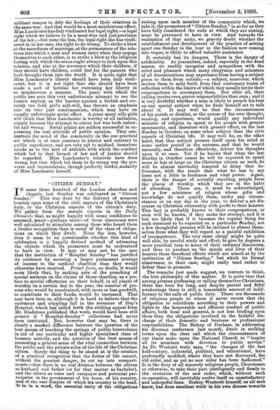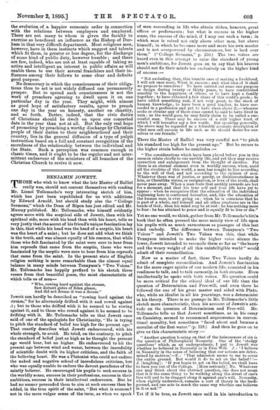" CITIZEN SUNDAY."
IN some three hundred of the London churches and chapels, last Sunday was celebrated as " Citizen Sunday." This was done by the delivery of sermons bearing upon some of the civic aspects of the Christian's duty, or the Christian aspects of the citizen's duty. We gather from the sample reports in the Daily Chronicle that, as might happily with some confidence be assumed, many—perhaps most—of these discourses were well calculated to stimulate among those who heard them a livelier recognition than is usual of the class of obliga- tions on which they dwelt. None the less, however, does it seem to us questionable whether this kind of celebration is a happily devised method of advancing the objects which its promoters must be understood to have in view. It may or may not be the case that the institution of " Hospital Sunday " has justified its existence by securing a larger permanent average of income to the medical charities than they would otherwise have received. Prima facie, no doubt, it would seem likely that, by making sure of the preaching of special sermons on the claims of those charities, as a pre- face to special offertories on their behalf, in all places of worship on a certain day in the year, the number of per- sons who would be constrained, with more or less goodwill, to contribute to their funds, would be increased. That may have been so, although it is hard to believe that the enormous and crippling fall in the revenues of Guy's Hospital, which has called forth the striking appeal from Mr. Gladstone published this week, would have been still greater if " Hospital-Sunday " collections had never been instituted. But, however that may be, there is clearly a marked difference between the question of the best means of touching the springs of public benevolence in aid of one particular and highly specialised class of humane activity, and the question of the best means of promoting a general sense of the vital connection between the public and the private sides of the life of the Christian citizen. Surely the thing to be aimed at is the creation of a practical recognition that the duties of life cannot, without the greatest danger, be cut up into compart- ments—that there is no real division between the citizen as husband and father (or for that matter as bachelor), and the citizen as voter and ratepayer and potential par- ticipator in the government of his town, of his country, and of the vast Empire of which his country is the heads i It is, in a word, the essential unity of the obligations resting upon each member of the community which, we take it, the promoters of " Citizen Sunday," in so far as they have fully considered the ends at which they are aiming, must be presumed to have in view. And towards the realisation of that unity, we gravely doubt whether the establishment and development of the practice of setting apart one Sunday in the year in the fashion now coming into vogue, is likely to afford valuable assistance.
It certainly has its dangers. There is the danger of artificiality. As journalists, indeed, especially in the dead season, we readily recognise and sympathise with the relief and pleasure which many clergymen and ministers of all denominations may experience from having a subject given to them from outside,—a subject, moreover, which invites them to sally forth from that customary realm of reflection within the limits of which they usually invite their congregations to accompany them. But after all, their calling carries even graver responsibilities than ours ; and it is very doubtful whether a man is likely to preach his best on any special subject when he finds himself set to talk about it. It may well be that the circumstances of his parish or district, or the course of his own thought, reading, and experience, would qualify any individual minister of religion to speak to his people with greater spontaneity, and therefore with greater effect, on the last Sunday in October, on some other subject than the civic aspects of Christian life. It may well be, on the other hand, that that subject presses itself upon his mind at some earlier period in the autumn, and that he would naturally, and therefore effectively, deliver his thoughts upon it at once. Yet if he knows that when the last Sunday in October comes he will be expected to speak more or less at large on the Christian citizen as such, he will be almost inevitably tempted to delay that de- liverance, with the result that what he has to say loses not a little in freshness and vital power. Again, there is the danger of actually repelling people from the places of worship which they are in the habit of attending. There are, it must be acknowledged, not a few ministers of religion whose gifts and knowledge do not qualify them, under any circum- stances or on any day in the year, to deliver a set dis- course on Christian citizenship with profit to their hearers. This fact is probably known to their congregations, or soon will be known, if they make the attempt, and it is but too likely that if it becomes the regular thing for such exercises to be expected on a particular Sunday, not a few thoughtful persons will be inclined to absent them- selves from what they will regard as a painful exhibition of incompetence. The very same clergy might be quite well able, by careful study and effort, to give by degrees a more practical turn to many of their ordinary discourses, and thus to produce on the minds and lives of their hearers those beneficial effects which are aimed at by the institution of " Citizen Sunday," but which its formal observance, in their case, might really tend rather to defeat than to promote.
The remarks just made suggest, we venture to think, the true philosophy of this matter. It is quite true that among persons professing or calling themselves Christians, there has been for long, and despite partial and fitful awakenings there is still, a lamentable amount of indif- ference to the calls of public duty. There are thousands of religious people to whom it never occurs that the obligation to contribute according to their powers and lights to the honourable and efficient conduct of public affairs, both local and general, is not less binding upon them than the obligations involved in the faithful dis- charge of their domestic and business or professional responsibilities. The Bishop of Durham, in addressing his diocesan conference last month, dwelt in striking terms upon the clear call which the circumstances of our times make upon the National Church to " inspire all its members with devotion to public service." As Dr. Westeott truly says, " the changes of the last half-century, industrial, political, and educational, have profoundly modified, where they have not destroyed, the old order, and as yet no new order has been fashioned." It is the duty of all sincerely religious people, Churchmen or otherwise, to take their part intelligently and firmly in the evolution of the new order, which, without such co-operation, will inevitably evolve itself on unsatisfactory and unhopeful lines. Bishop Westeott himself; as all men know, has done excellent work in his own diocese towards the evolution of a happier economic order in connection with the relations between employers and employed. There are not many to whom is given the faculty to exercise so beneficent an influence as the Bishop of Dur- ham in that very difficult department. Most religious men, however, have in them instincts which suggest and talents which fit them, in greater or less degree, for the discharge of some kind of public duty, however humble ; and there are few, indeed, who are not at least capable of taking so active and intelligent an interest in public affairs as will enable them to use their several franchises and tbeir in- fluences among their fellows to some clear and definite good purpose.
No democracy in which the consciousness of their obliga- tions thus to act is not widely diffused can permanently prosper. But to spread such consciousness is not the work of preachers agreeing to dwell upon it on one particular day in the year. They might, with almost as good hope of satisfactory results, agree to preach one day in the year on honesty, another on chastity, and so forth. Better, indeed, that the civic duties of Christians should be dwelt on upon one concerted date in the year than not at all. But the only real hope of promoting by preaching a worthy discharge by Christian people of their duties to their neighbourhood and their country, lies in the general diffusion of a type of pulpit instruction based on a full and constant recognition of the sacredness of the relationship between the individual and the State. Such a perception was common enough in classic times, and it ought to be the regular and not inter- mittent endeavour of the ministers of all branches of the Christian Church to revive it now.



















































 Previous page
Previous page